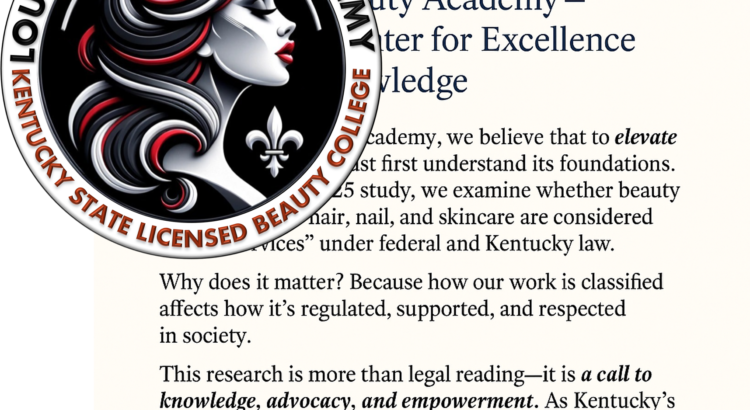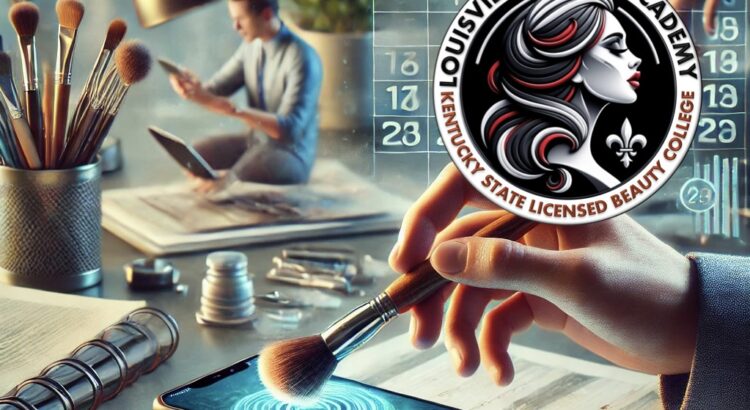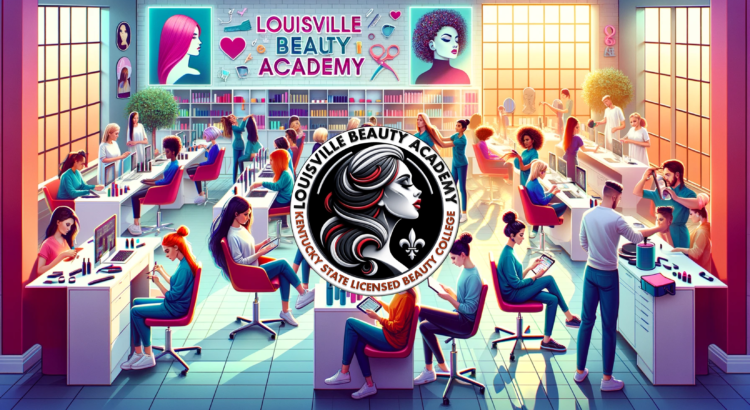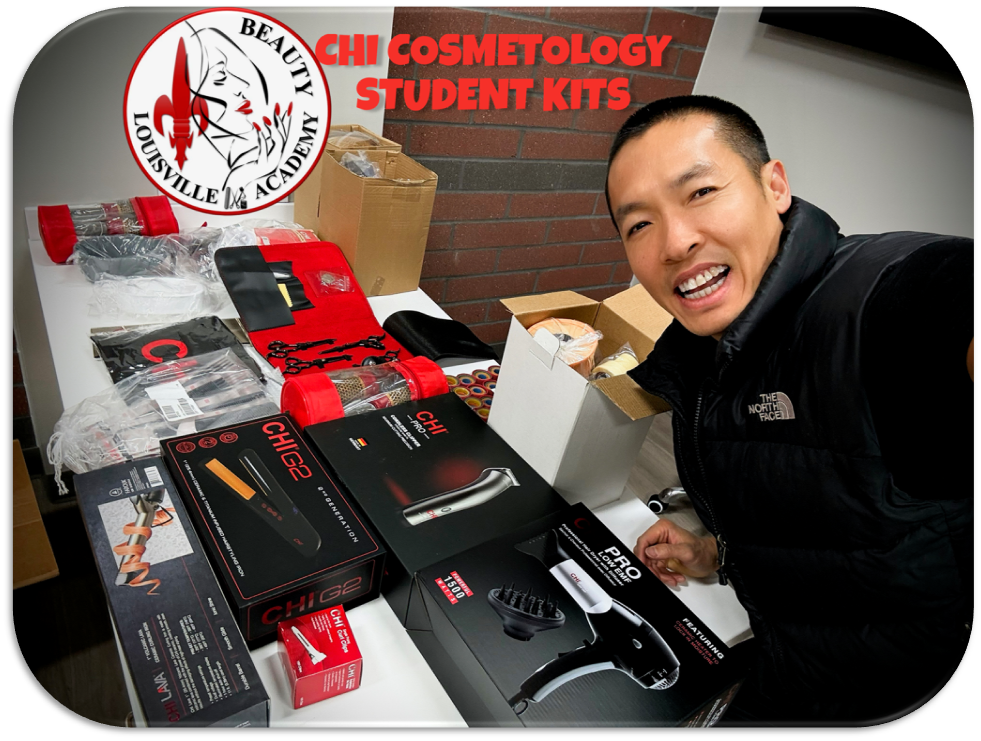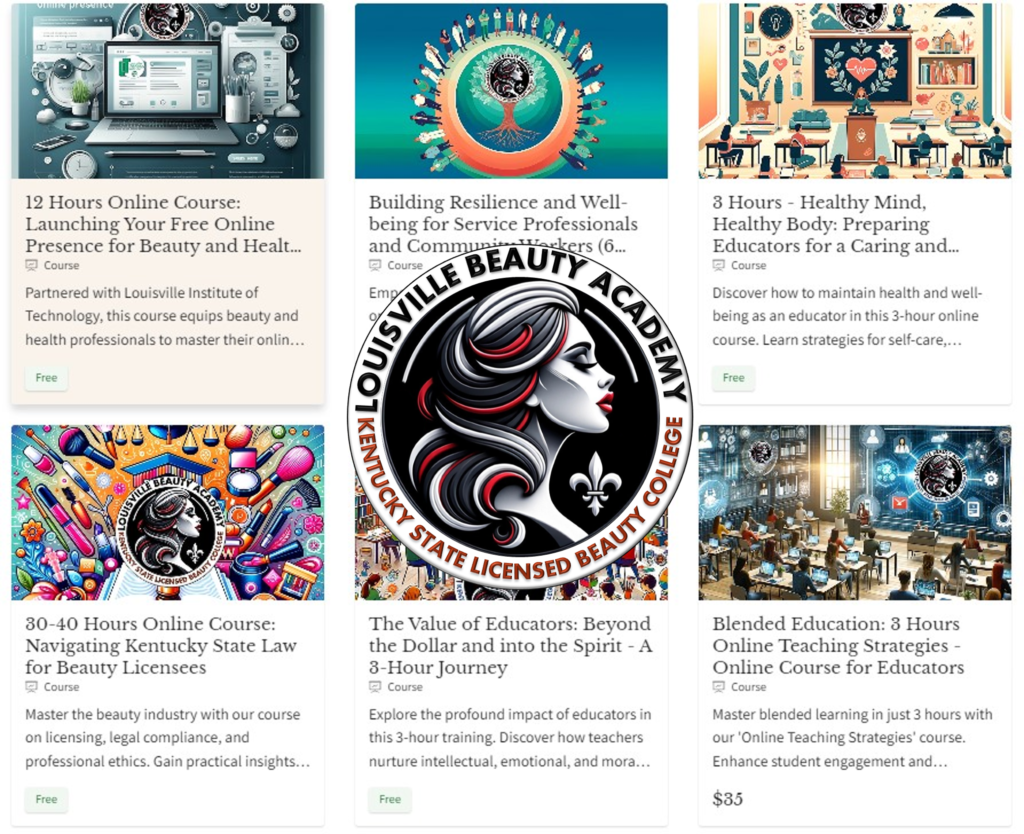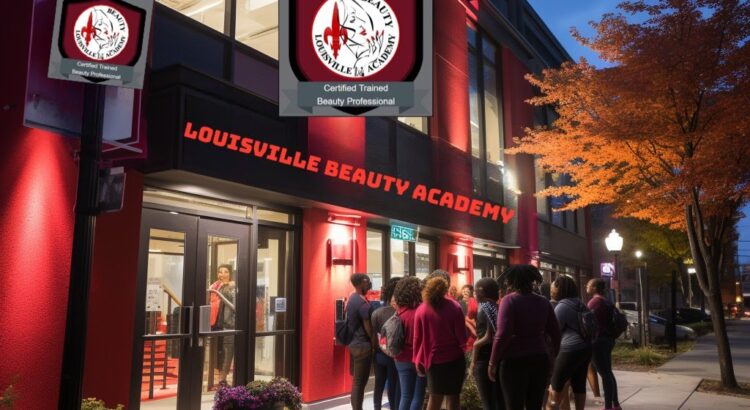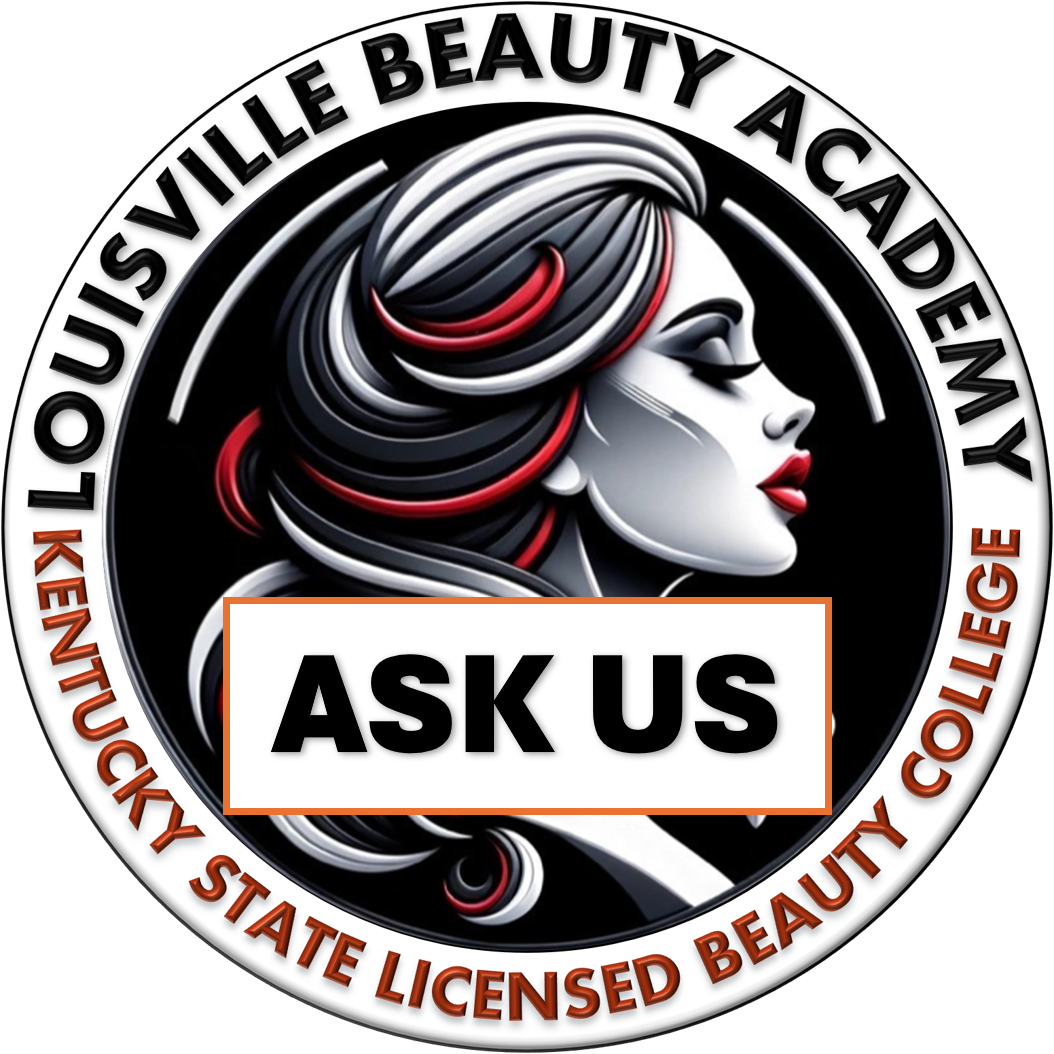At Louisville Beauty Academy, we believe that to elevate the profession, we must first understand its foundations. In this in-depth 2025 study, we examine whether beauty services such as hair, nail, and skincare are considered “health services” under federal and Kentucky law.
Why does it matter? Because how our work is classified affects how it’s regulated, supported, and respected in society.
This research is more than legal reading—it is a call to knowledge, advocacy, and empowerment. As Kentucky’s leading beauty school and industry advocate, LBA positions itself not only as a place for training and licensure, but also as a policy-minded protector of the beauty profession.
Our goal is simple but powerful: Elevate yourself through study, elevate the industry through law. Let this document guide you—whether you’re a student, graduate, policymaker, or school owner—toward understanding your rights, your boundaries, and your future in beauty.
As we expand beyond Kentucky, our commitment stays rooted in this principle: Protect the practice, defend the profession, and educate the public. The beauty industry is not just about services; it’s about dignity, empowerment, and safety
Thanks for clarifying. I’ll look into whether beauty services like hair, nail, and skincare are legally or professionally considered part of health services—particularly in relation to physical or mental health—under both federal law and Kentucky state law. I’ll also check if there are any recent developments or classifications that reflect this connection.
I’ll update you soon with the findings.
Beauty Services vs. Health Services: Federal and Kentucky Law Perspectives
Beauty services like hair care, nail care, and skincare are generally not classified as “health services” or healthcare under U.S. federal law or Kentucky state law. Instead, they fall under cosmetology/beauty industry regulations. However, legal frameworks do recognize that personal care and appearance can impact well-being (especially mental health), and there are a few overlaps where beauty services intersect with health contexts. Below is a detailed analysis with relevant definitions, classifications, and recent developments at both the federal and state levels, followed by a summary table of key statutes and agency positions.
Federal Law Perspective
Definitions of “Health Service” or “Healthcare” (Federal)
Federal laws and regulations define “health care services” in clinical terms, focusing on medical or therapeutic care for physical and mental conditions. For example, U.S. Department of Health and Human Services (HHS) regulations under HIPAA define “health care” as “care, services, or supplies related to the health of an individual,” including “preventive, diagnostic, therapeutic, rehabilitative, maintenance, or palliative care, and counseling, service, assessment, or procedure with respect to the physical or mental condition…of an individual”. This definition centers on services aimed at maintaining or improving health or treating illness (whether physical or mental). Similarly, general usage defines health care as efforts by trained professionals to maintain or restore physical, mental, or emotional well-being.
Notably, cosmetology and beauty services are not included in these healthcare definitions. Hairdressing, manicures, facials, and similar beauty treatments do not diagnose or treat medical conditions, and they do not affect the body’s structure or function in the clinical sense. In other words, beauty services are considered personal care or cosmetic services, not “health services,” under federal definitions of healthcare.
Beauty Services vs. Healthcare in Federal Law and Policy
Because beauty services are not viewed as health care, federal health statutes and programs generally exclude them. For instance, Medicare (the federal health insurance for seniors and certain disabled individuals) explicitly does not cover routine beauty or barber services. The Medicare Benefit Policy Manual lists “beauty and barber services” as non-covered items, treating them as personal comfort items rather than medically necessary care. The only exceptions are narrow cases incidental to medical care (e.g. shaving or hair trimming that might be done as part of a medical procedure), but a typical salon service is not reimbursed by Medicare or Medicaid. This reflects a clear federal stance: grooming and cosmetic services are not health services for purposes of health insurance coverage.
Federal regulations draw a distinction between medical care and personal-care assistance. For example, Medicaid’s Personal Care Services benefit covers help with Activities of Daily Living (ADLs) – tasks like bathing, dressing, grooming – for individuals who need assistance to live at home. These personal-care activities, while important for hygiene and quality of life, are categorized separately from medical services. The aides providing such help are not delivering medical treatment. In fact, federal guidance notes that “unlike home health aides or nurse assistants, personal care aides do not support the delivery of health care.” In short, even when grooming and hygiene are provided as part of a care plan, they are considered supportive services, not healthcare treatments.
Mental Health and Well-Being Considerations (Federal Perspective)
Although beauty services are not healthcare, federal agencies acknowledge that personal appearance and grooming can affect mental health and overall well-being. The Substance Abuse and Mental Health Services Administration (SAMHSA) and other HHS agencies emphasize holistic wellness, which can include self-care and confidence in one’s appearance as factors in mental health. For example, the Office on Women’s Health (HHS) explains that a positive body image – feeling comfortable with one’s appearance – correlates with better mental health outcomes. Women (and men) who feel good about how they look often experience improved self-esteem and emotional well-being, whereas negative body image is linked to higher risk of depression and anxiety.
This suggests that, indirectly, beauty services may contribute to mental health by improving individuals’ self-esteem, confidence, and social engagement. A relaxing haircut, manicure, or facial can relieve stress and improve mood for many people. Indeed, federal public health initiatives have leveraged beauty salons and barbershops as community touchpoints for wellness outreach. Studies have shown the feasibility of training beauty professionals as lay health educators (for example, disseminating health information in Black hair salons). And programs exist where barbershops participate in blood pressure screenings or mental health awareness, recognizing the trusted relationship between cosmetologists/barbers and clients. However, these are public health outreach strategies – they do not legally transform beauty services into “healthcare.”
In summary, under federal law cosmetology and esthetic services are not categorized as health care services. They are regulated as personal service occupations, separate from the medical industry. Federal agencies recognize the psychological and social benefits of grooming and personal care (especially for mental health and quality of life), but legally such services are not part of the healthcare delivery system. Beauticians are not healthcare providers, and their services are not governed by health care laws (aside from general public safety regulations).
Kentucky State Law Perspective
Definitions and Regulatory Framework in Kentucky
Kentucky law draws a similar line between health services and beauty services. Cosmetology, esthetics, and nail care are regulated under KRS Title XXVI (Occupations and Professions), Chapter 317A, separate from the laws governing health professions. Kentucky’s statutes and regulations do not include routine beauty services within the definition of “health services” or “health care.” In fact, recent legislation has made this delineation especially clear. In 2024, the Kentucky General Assembly passed Senate Bill 14, which updated cosmetology laws. The law “delineates the boundaries of practice for cosmetology, esthetic practices, and nail technology, ensuring that these professions are solely focused on cosmetic purposes and not on treating physical or mental ailments.” (Emphasis added). This statutory language confirms that, under Kentucky law, beauty professionals are not healthcare providers and must not purport to diagnose, treat, or address medical conditions. Their scope is limited to cosmetic improvement of hair, skin, and nails for appearance purposes.
Consistent with that framework, Kentucky’s definitions of “health care” or “health services” (found in contexts like public health or insurance law) do not list cosmetologists or salons. Health services typically refer to medical, dental, nursing, counseling, or therapeutic services provided by licensed health professionals. Cosmetologists are licensed, but under the Kentucky Board of Cosmetology rather than the Boards of Medical Licensure, Nursing, or other health boards. Thus, a hair stylist or esthetician in Kentucky is not legally recognized as a provider of health care.
Instead, beauty services are overseen by the Kentucky Board of Cosmetology, whose mission is to set educational, health, and safety standards for the beauty industry. The Board’s regulations (201 KAR Chapter 12) focus on sanitation, hygiene, and public safety in salons – for example, requiring proper disinfection of tools, cleanliness of facilities, and adherence to health/safety rules to protect clients from infections or injuries. These rules are essentially public health measures, developed in part with oversight from the Kentucky Cabinet for Health and Family Services for sanitation standards. But importantly, they do not transform salons into health clinics; they simply ensure that beauty services do not themselves become a health hazard. The Kentucky Department for Public Health does not list beauty treatments as health services, though it may collaborate in setting infection-control guidelines for salons. Enforcement remains with the cosmetology board via inspections and licensing discipline.
Licensing and Legal Status of Beauty Practitioners in KY
All individuals providing hair, nail, or skin services in Kentucky must be licensed by the Kentucky Board of Cosmetology (KRS 317A.050-.062). This licensure is an occupational license, not a health professional license. By law, cosmetologists/estheticians cannot perform acts that constitute the practice of medicine (KRS Chapter 311) or nursing (KRS 314). For example, they cannot prescribe medications, perform invasive procedures, or claim to treat skin diseases – those actions would violate medical licensing laws. SB 14 (2024) re-emphasized this by clarifying that cosmetic practice must not encroach on treating physical or mental health conditions.
Kentucky does, however, require that salons meet certain health and sanitation criteria precisely to protect clients. The Board of Cosmetology is empowered to take action to protect public health and safety – including emergency orders or referrals for prosecution if an establishment poses health risks. This means that while cosmetologists are not health care providers, their work is subject to health-related regulations (sanitation, hygiene) to prevent harm. This is analogous to how the state might regulate restaurants for health code compliance without classifying chefs as healthcare workers.
Intersections with Physical and Mental Health in Kentucky
Kentucky law contains a few “cross-over” allowances where beauty services intersect with health settings, acknowledging the supportive role these services can play:
- Services for Hospice Patients: State law permits licensed cosmetologists and similar professionals to provide beauty services to patients in hospice care (and to deceased persons in funeral homes) outside of the usual salon premises. Normally, KY law requires cosmetology services to be performed in a licensed salon facility, but KRS 317A.155(3) creates an exception for terminally ill individuals under hospice care. This allowance recognizes that grooming – a haircut, shave, or nail care – can enhance the comfort and dignity of someone facing end-of-life or serious illness. While not medical treatment, these services may improve the patient’s mental well-being and quality of life. The law essentially facilitates cosmetologists contributing to patients’ emotional health (feeling cared-for and presentable) in healthcare settings, without reclassifying the services as healthcare.
- Medispas and “Medical Esthetics”: As the beauty and wellness industry evolves, some businesses offer procedures that blur the line between purely cosmetic and medical. In Kentucky, so-called medical spas (medispas) provide services like Botox injections, laser hair removal, chemical peels, etc., alongside traditional spa treatments. By law, many of these advanced procedures constitute the practice of medicine or nursing, so they require licensed medical professionals to perform or supervise them. Currently, medispas in Kentucky are often jointly regulated: the establishment itself may be licensed as a salon by the Board of Cosmetology, but any medical procedures must be overseen by a physician or nurse practitioner in compliance with the Kentucky Board of Medical Licensure and Board of Nursing rules. In other words, an esthetician can operate a facial machine or apply non-invasive skin treatments, but if the service goes into medical territory (e.g. injecting a dermal filler or using a prescription-grade laser), it’s legally a health service requiring a healthcare license. The state legislature has recognized this gray area – a 2022 bill (HB 340) was introduced to formally define “medical spa” and require that medispas be owned or operated by licensed health practitioners (physician, nurse) or jointly with a cosmetologist, with medical personnel on-site when medical esthetic services are provided. Although that particular bill did not pass in 2022, it reflects an ongoing regulatory effort to integrate beauty and health services safely by delineating who can do what. It reinforces that cosmetologists alone cannot perform health treatments, ensuring patient safety in these hybrid wellness settings.
- Mental Health and Community Initiatives: Kentucky, like many states, has recognized the informal mental health role that barbers and cosmetologists can play in the community. While not codified in statute, there are local programs training salon professionals to spot signs of domestic abuse or mental distress in their clients and to refer them to help (some states mandate a brief training on this for license renewal). These initiatives rest on the idea that beauty service providers often develop trusting relationships with clients, who may confide in them. Kentucky’s focus has been more on public health and safety training (e.g. sanitation and now a recently added allowance for using certain tools per SB 14), but the therapeutic value of a salon visit is commonly acknowledged. Anecdotally, a trip to the salon can uplift mood and self-esteem, contributing to an individual’s mental health on a personal level. However, it is important to note that this is not a licensed mental health service – a cosmetologist is not a counselor. The benefit is a secondary effect of personal care on a person’s well-being, which Kentucky’s laws neither prohibit nor formally address, but implicitly value by allowing services in settings like hospice as noted above.
In summary, Kentucky law keeps a clear boundary: Beauty services are regulated to ensure they are safe and hygienic, but they are not categorized as health care and must remain purely cosmetic in scope. Recent updates (SB 14 in 2024) explicitly state that cosmetology and related fields do not treat physical or mental ailments. When beauty services occur in a health-related context (such as a hospital, nursing home, or medspa), Kentucky law requires compliance with any applicable medical rules and often the involvement of medical professionals for anything beyond basic cosmetic care. Beauty professionals in those settings contribute to patients’ comfort and mental well-being, but do not become healthcare providers by virtue of the setting. They remain within their cosmetic practice license.
The following table summarizes relevant statutes, regulations, and agency positions regarding whether beauty services are considered part of health services, and how they relate to physical and mental health:
| Source / Law | Jurisdiction | Definition or Position | Treatment of Beauty Services |
|---|---|---|---|
| HIPAA Regs (45 CFR 160.103) | Federal | Defines “health care” as services related to an individual’s physical or mental health condition. Focus is on prevention, diagnosis, treatment of illness or impairment. | Beauty services not included – they do not address a health condition or function, so cosmetology falls outside this definition of health care. |
| Medicare Policy (CMS) | Federal | Medicare excludes “beauty and barber services” as not medically necessary. These personal grooming services are not covered by Medicare or Medicaid. | Confirms that hair/nail/skincare services are not recognized as health services for insurance purposes. (They are considered personal comfort or private-pay services.) |
| HHS Office on Women’s Health | Federal | States that positive body image and feeling good about one’s appearance are linked to better mental and physical health outcomes. Negative body image can contribute to depression or other issues. | Acknowledges mental health benefits of good appearance and self-care. Implies beauty routines can support emotional well-being, but this is a wellness perspective, not a legal reclassification of beauty services as healthcare. |
| KY Senate Bill 14 (2024) – now KRS 317A (various sections) | Kentucky | Updated cosmetology law to “ensure these professions are solely cosmetic and not treating physical or mental ailments.” Also expanded Board powers to protect public health. | Explicitly separates beauty services from healthcare in state law. Cosmetologists may only perform cosmetic services, not medical or mental health treatment. Confirms that beauty services are outside the health services realm legally (while emphasizing public safety). |
| KRS 317A.155(3) (Hospice Exception) | Kentucky | Allows licensed cosmetologists, estheticians, and nail techs to provide services to hospice patients (and to the deceased in funeral homes) outside of salon premises. | Recognizes a supportive role for beauty care in health settings. Even though not health care, such services are permitted for the comfort, dignity, and mental well-being of the ill, showing an integration of beauty into holistic care. |
| 201 KAR 12:060 (Cosmetology Health & Safety Reg) | Kentucky | Requires salons and schools to meet strict health and safety standards to protect the public (sanitation, disinfection, etc.). Regulations promulgated with approval of health authorities for cleanliness. | Treats salons as regulated environments for public health protection, but does not classify services as healthcare. (Cosmetology board inspectors enforce hygiene, ensuring beauty services don’t pose health risks such as infections.) |
| MedSpa Oversight (Regulatory Practice) | Kentucky | Kentucky law and boards dictate that medical esthetic procedures (e.g. Botox, laser) at medspas require a licensed physician, PA, or nurse to perform or supervise. Cosmetologists/estheticians may only do non-medical cosmetic procedures. Legislative proposals (e.g. HB 340 in 2022) sought to formalize this by defining “medical spa” and requiring medical ownership/supervision. | Demonstrates the boundary between health services and beauty services. When a service constitutes medical treatment, it falls under health care licensing. Cosmetologists can participate in spa services, but any health care acts (injections, etc.) must be done by health professionals. This preserves the legal separation: beauty practitioners are not health care providers, though they can work alongside them in integrated wellness settings with proper oversight. |
Sources: The definitions and policies above are drawn from federal regulations and guidance (HHS/CMS) and Kentucky statutes and administrative regulations. Notably, HIPAA’s definition of health care, Medicare coverage rules, and Kentucky’s cosmetology laws all reinforce that beauty services are not classified as health care services. At the same time, public health literature and agency resources recognize the contribution of personal care to mental health and well-being. Kentucky’s recent legislative changes (SB 14 in 2024) codify the scope of cosmetology as purely cosmetic, not medical or therapeutic, while still enabling collaborative settings (like medspas or hospice visits) where beauty services can complement a person’s overall wellness.
Conclusion
In conclusion, under both federal law and Kentucky law, hair care, nail care, and skincare services are not considered part of “health services” or healthcare. They are regulated in separate legal domains focused on consumer protection, sanitation, and professional licensing in the beauty industry. Cosmetology and related services are not legally recognized as providing treatment for physical or mental health conditions. However, these services are acknowledged to have ancillary benefits: maintaining personal hygiene is important for physical health (preventing infection, etc.), and looking and feeling good can boost mental health and quality of life. Federal agencies like HHS recognize the link between grooming, self-esteem, and mental wellness, and Kentucky law provides avenues for beauty professionals to contribute to well-being in settings like hospice care.
Ultimately, the integration of beauty and wellness remains mostly informal or supportive – e.g. barbers and stylists as community health messengers or sources of emotional support – rather than a formal part of health care delivery. Legal classifications remain clear that beauty services serve cosmetic and personal care purposes, while health services address medical and therapeutic needs. Kentucky’s current statutes and regulations reflect this separation, even as they encourage safe collaboration (through sanitation standards and allowing certain crossover services under proper conditions) to enhance the overall wellness of individuals.
📚 References
Centers for Medicare & Medicaid Services. (n.d.). Medicare Benefit Policy Manual: Chapter 16 – General Exclusions from Coverage. Retrieved from https://www.cms.gov
Commonwealth of Kentucky. (2024). Senate Bill 14: An Act Relating to Cosmetology (2024 Regular Session). Retrieved from https://apps.legislature.ky.gov
Commonwealth of Kentucky. (n.d.). Kentucky Revised Statutes Chapter 317A – Board of Cosmetology. Retrieved from https://apps.legislature.ky.gov/law/statutes/chapter.aspx?id=38880
Commonwealth of Kentucky. (n.d.). 201 KAR Chapter 12 – Kentucky Board of Cosmetology Administrative Regulations. Retrieved from https://apps.legislature.ky.gov/law/kar/title201.htm
Health and Human Services, U.S. Department of. (2023). HIPAA Privacy Rule and Its Impact on State Laws. 45 CFR §160.103. Retrieved from https://www.hhs.gov/hipaa/for-professionals/privacy/laws-regulations/index.html
Health and Human Services, U.S. Department of, Office on Women’s Health. (2021). Body image and mental health. Retrieved from https://www.womenshealth.gov/mental-health/body-image
Kentucky Board of Cosmetology. (n.d.). Sanitation Requirements and Facility Inspection Guidelines. Retrieved from https://kycosmo.boardsofkentucky.gov/
Kentucky General Assembly. (2022). House Bill 340: An Act Relating to Medical Spas (2022 Regular Session). Retrieved from https://apps.legislature.ky.gov/record/22rs/hb340.html
National Institutes of Health. (2020). Personal care services under Medicaid: Definitions and distinctions. Retrieved from https://www.medicaid.gov
Substance Abuse and Mental Health Services Administration (SAMHSA). (2021). Wellness Strategies and Behavioral Health. Retrieved from https://www.samhsa.gov/wellness-initiative
U.S. Department of Health and Human Services. (2021). Defining health care and health services: Federal policy guidance. Retrieved from https://www.hhs.gov
